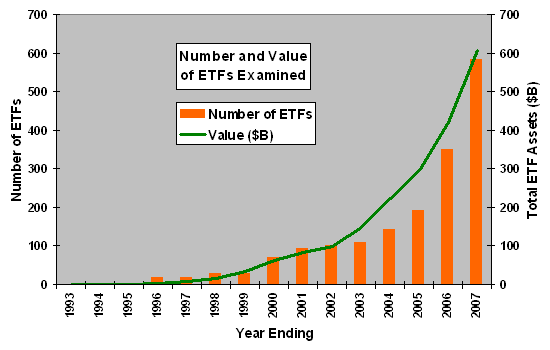Do Exchange Traded Funds (ETF) outperform comparable index mutual funds because of lower fees? In their November 2008 preliminary paper entitled “Exchange Traded Funds: Performance and Competition”, Marko Svetina and Sunil Wahal examine the performance of a very large number of ETFs over their entire histories relative both to their theoretical indexes and to matched index mutual funds. Using data for 584 domestic equity, international equity and fixed income ETFs and their indexes from their inception to the end of 2007, along with comparable data for matched index mutual funds, they conclude that:
- The number of ETFs and the assets they manage has grown dramatically since their introduction (see chart below).
- There is an enormous variety of ETFs with respect to type of asset class/market/style/sector index followed, degree of passivity and use of leverage.
- Nearly 83% of ETFs track narrow market segments with no comparable index mutual funds.
- On average, ETFs underperform their benchmark indexes, with tracking errors likely derived from tradeoffs between rebalancing and trading fees.
- The 17% of ETFs that compete directly with index mutual funds provide returns very close to those provided by those mutual funds. Net of fees/transaction costs, domestic equity ETFs outperform matched retail index mutual funds by a statistically uncompelling 0.31% per year, with indications that the difference in performance is largely driven by fees.
The following chart, constructed from data in the paper, shows the number of ETFs examined in the study, along with their total aggregate year-end asset value during 1993-2007. The authors excluded 45 ETFs for which they could not obtain sufficient data.

In summary, ETFs offer easy and unique (even leveraged) access to a wide range of asset class/market/style/sector indexes. The 17% of ETFs that compete directly with index mutual funds perform similarly to, or perhaps slightly better than, those mutual funds.